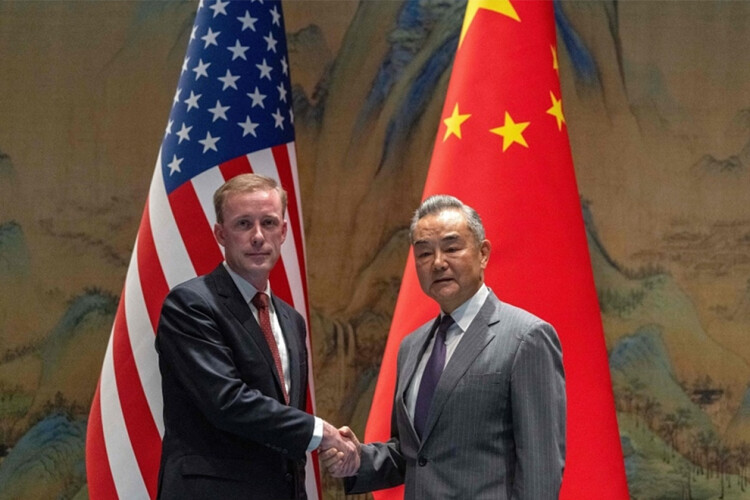
The US and China have agreed to expand military-to-military contact and hold a second round of talks on artificial intelligence (AI) cooperation, even as disagreements on core issues remain.
A possible call between US President Joe Biden and his counterpart Xi Jinping “in the coming weeks” was also discussed between US National Security Adviser Jake Sullivan and China’s top diplomat Wang Yi at their two-day talks in Beijing which ended on Aug 28.
Both sides agreed to maintain high-level exchanges, while continuing to cooperate in areas such as drug control, law enforcement, climate change and the repatriation of illegal immigrants, according to official statements from both sides.
Mr Sullivan’s visit was the fourth of such strategic talks between the two leaders since May 2023, when they met in Vienna to lay the groundwork for the first of a series of top-level bilateral meetings that restored a measure of stability to the bilateral relationship.
Both superpowers are locked in a competitive relationship over issues including technological sanctions, Taiwan, brewing tensions in the South China Sea and China’s support for Russia in the Ukraine war.
These were all issues that reflected deep-seated differences, with no immediate resolutions, and meant that expectations for any breakthroughs going into the meeting were low.
A US senior administration official said in a briefing before Mr Sullivan’s trip that the aim was not specific deliverables, but more about clearing up misperceptions and preventing competition from veering into conflict.
On Aug 28, the read-outs from both sides agreed that they had engaged in “candid, substantive and constructive discussion” over the two days.
Both sides discussed a possible new round of interaction between the two heads of state, and agreed to hold a call between military leaders at the theatre level.
Beijing also said a second round of China-US intergovernmental dialogue on AI would be held at an appropriate time.
Mr Biden and Mr Xi last met at a November 2023 summit in California, while the first such bilateral AI talks were held in Geneva in May 2024. That same month, US Defence Secretary Lloyd Austin met his counterpart Dong Jun in Singapore on the sidelines of the Shangri-La Dialogue, the first time both top defence officials had met in person since 2022.
The US added that both sides welcomed further discussion during US senior adviser to the president for international climate policy John Podesta’s “upcoming travel to China”.
In Beijing, Mr Wang outlined the Chinese view of the relationship, saying that the key to successful development of Sino-US interactions is to treat each other as equals. “Starting from a position of strength is not the right way for countries to interact,” he said.
But there was little indication that any headway was made on substantive disagreements.
On the South China Sea, which has seen repeated clashes between Chinese and Philippine ships in recent months, Mr Wang emphasised that “China is firmly committed to safeguarding its territorial sovereignty and maritime rights over the South China Sea islands”.
But Mr Sullivan, in the US statement, said he “expressed concerns about the PRC’s destabilising actions against lawful Philippine maritime operations”, referring to the People’s Republic of China.
Mr Wang also said the US “should stop suppressing China in the economic, trade and technological fields and stop harming China’s legitimate interests”.
Since October 2022, the Biden administration has banned exports of top-end computer chips to China, hampering its development in fields such as AI, as well as sales of chipmaking tools and design software.
Mr Sullivan stressed that the US will “continue to take necessary actions to prevent advanced US technologies from being used to undermine our national security”. He also raised concerns about the “PRC’s unfair trade policies and non-market economic practices”.
Asia News Network (ANN)/The Straits Times
A possible call between US President Joe Biden and his counterpart Xi Jinping “in the coming weeks” was also discussed between US National Security Adviser Jake Sullivan and China’s top diplomat Wang Yi at their two-day talks in Beijing which ended on Aug 28.
Both sides agreed to maintain high-level exchanges, while continuing to cooperate in areas such as drug control, law enforcement, climate change and the repatriation of illegal immigrants, according to official statements from both sides.
Mr Sullivan’s visit was the fourth of such strategic talks between the two leaders since May 2023, when they met in Vienna to lay the groundwork for the first of a series of top-level bilateral meetings that restored a measure of stability to the bilateral relationship.
Both superpowers are locked in a competitive relationship over issues including technological sanctions, Taiwan, brewing tensions in the South China Sea and China’s support for Russia in the Ukraine war.
These were all issues that reflected deep-seated differences, with no immediate resolutions, and meant that expectations for any breakthroughs going into the meeting were low.
A US senior administration official said in a briefing before Mr Sullivan’s trip that the aim was not specific deliverables, but more about clearing up misperceptions and preventing competition from veering into conflict.
On Aug 28, the read-outs from both sides agreed that they had engaged in “candid, substantive and constructive discussion” over the two days.
Both sides discussed a possible new round of interaction between the two heads of state, and agreed to hold a call between military leaders at the theatre level.
Beijing also said a second round of China-US intergovernmental dialogue on AI would be held at an appropriate time.
Mr Biden and Mr Xi last met at a November 2023 summit in California, while the first such bilateral AI talks were held in Geneva in May 2024. That same month, US Defence Secretary Lloyd Austin met his counterpart Dong Jun in Singapore on the sidelines of the Shangri-La Dialogue, the first time both top defence officials had met in person since 2022.
The US added that both sides welcomed further discussion during US senior adviser to the president for international climate policy John Podesta’s “upcoming travel to China”.
In Beijing, Mr Wang outlined the Chinese view of the relationship, saying that the key to successful development of Sino-US interactions is to treat each other as equals. “Starting from a position of strength is not the right way for countries to interact,” he said.
But there was little indication that any headway was made on substantive disagreements.
On the South China Sea, which has seen repeated clashes between Chinese and Philippine ships in recent months, Mr Wang emphasised that “China is firmly committed to safeguarding its territorial sovereignty and maritime rights over the South China Sea islands”.
But Mr Sullivan, in the US statement, said he “expressed concerns about the PRC’s destabilising actions against lawful Philippine maritime operations”, referring to the People’s Republic of China.
Mr Wang also said the US “should stop suppressing China in the economic, trade and technological fields and stop harming China’s legitimate interests”.
Since October 2022, the Biden administration has banned exports of top-end computer chips to China, hampering its development in fields such as AI, as well as sales of chipmaking tools and design software.
Mr Sullivan stressed that the US will “continue to take necessary actions to prevent advanced US technologies from being used to undermine our national security”. He also raised concerns about the “PRC’s unfair trade policies and non-market economic practices”.
Asia News Network (ANN)/The Straits Times










